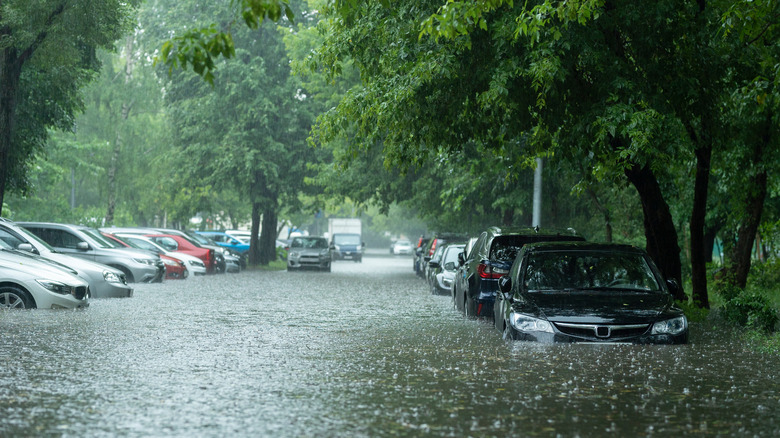5 Tips For Relocating To Another State
Moving to a new state brings about excitement and a fantastic experience in both the preparation and aftermath. Moving to a new home is a great opportunity to tap into your needs as an individual or as a family and improve the lifestyle and fiscal realities for everyone involved. But moving is challenging; there are a huge number of tasks to complete during a move (via Moving.com), and these requirements are amplified when considering an out of state move. Not only does this change of scenery take longer — based on the sheer number of miles between your starting point and destination — but a move across state boundaries makes for an interesting set of challenges in terms of preparation and planning.
There are a number of essential tasks before, during, and after your move, beginning with research into the new city that you'll be calling home. It's a good idea to take a trip to the new city if you can to learn about the place with the benefit of personal experience alongside any reading that you do surrounding the area, per Travelocity. Additionally, research is a crucial step to take in any move because it will help you select the perfect location for your new home. With these five key tips in mind, targeting any research you'll do into this new place can be made more effective.
Budget for the move with time to spare
Moving is a significant financial commitment. In addition to the time it will take to pack up and transport your life from one home to another (which is a large undertaking regardless of whether it's a move across the street or country), this process is financially intensive as well. Forbes Advisor notes that homeowners can find a great many ways to save money during a move. But these can be time and energy exhaustive and may only save you a marginal amount in total dollars.
Home Advisor (via Zillow) estimates that it will cost between $2,000 and $5,000 to move out of state. These prices can vary depending on whether you're hiring a moving company to handle the logistics or are transporting your belongings without professional help, and the actual distance your move will cover. A trip from Tampa to Los Angeles will be less expensive on average than one that sees a relocation from Boston to Philadelphia.
Taking time to understand how much your move is likely to cost and budgeting for the expense with months to spare is the best way to ensure that you're able to make the decisions that will benefit your family the most. Packing and transportation, for instance, are labor intensive jobs that can be great bonding experiences or the dread of an entire family. Budget to allow for the expenses that will make your move easier in everyone involved.
Plan ahead for storage needs
Another important consideration to make is in storage. Moving creates a huge volume of boxes and belongings that need to be stored somewhere. Of course, you could bring all your belongings into the new property and sort through them there, but this will make for a much more chaotic overall process.
Finding a local storage facility to secure the belongings you don't need right away is going to be a massive lifesaver for you and your family, per Life Storage. Placing bulky items in storage helps you navigate the decorating and layout tasks that you're sure to encounter in a brand new space. As well, many homeowners want to purchase new couches, tables, and other items to create a completely new living space that departs from the atmosphere of the old house. If you've brought your old couches along with you, placing them in a self-storage facility while you decide what to do with the old models can help make room for some new additions to your life and living space.
Register your key documents with the authorities in your new state
When you move to a new state you'll need to register your car in the new location, change your driver's license over to the new location, and amend your address on financial records, according to My Move. This can take a good bit of time to complete because there are far more attachments than you might think to your current address. Canceling gym memberships, moving your cable, internet, and essential utilities to the new home (per Nationwide), and registering to vote in the new precinct and state are all important steps to take while transferring your residence to a new home and a new state.
When it comes to your driving needs, every state will have its own set of guidelines on how and when to report your change of address (and change of state). Consulting with the DMV and your local authority's guidance is the best course of action here.
It's also a good idea to visit your post office to enroll your name and old address in their mail forwarding program. There will always be some overlap in documentation and important pieces of mail, and this step will help ensure that nothing important slips through the cracks on its way to your new home.
Acquaint yourself with local weather conditions and requirements
Weather conditions vary across the United States. The nation spans an enormous continental landmass, and as such experiences a range of sometimes exciting and occasionally dangerous weather features and patterns. Homeowners moving to Florida, for instance, will certainly want to acquaint themselves with the proper procedure for dealing with hurricanes.
Gallup reports that one in three Americans have been affected by extreme weather conditions, suggesting definitively that intense weather patterns are a rule rather than an exception, regardless of where you call home. California residents are routinely on alert for earthquakes and forest fires, homeowners in the Midwest must contend with the potential for touchdown by tornadoes, and those living in northern regions spanning all the way across the country prepare each winter for extreme freezing and blizzard-level snowstorms. No matter where you plan to move, there will be some type of extreme weather that may threaten your way of living — or at the very least make a portion of the year just a little bit less comfortable.
Learning about the weather that you should expect in your new home in advance is an essential step to avoid shock later on in the year when the inevitable change in season brings along the less than favorable temperatures, humidity, or weather patterns that the area might be known for.
Don't forget to seek out plenty of fun
Last, but not least, it's important to seek out great outlets that will provide you and your family with oodles of fun in your new city. Whether you enjoy live sports, time at the beach, or a weekly trip to the movie theater, finding things to do that provide you with enjoyment is crucial to making the move worthwhile.
SmartBox suggests taking time to explore the town and your neighborhood. Learning about the opportunities for community engagement and all the fun things that your new home has to offer can be an exciting process all on its own. Additionally, take steps to ingratiate yourself with the new community. Joining clubs that interest you, striking up conversations with your new neighbors, and maintaining a friendly and approachable attitude are all great ways to make the transition from one city and state to another just a little bit easier.





